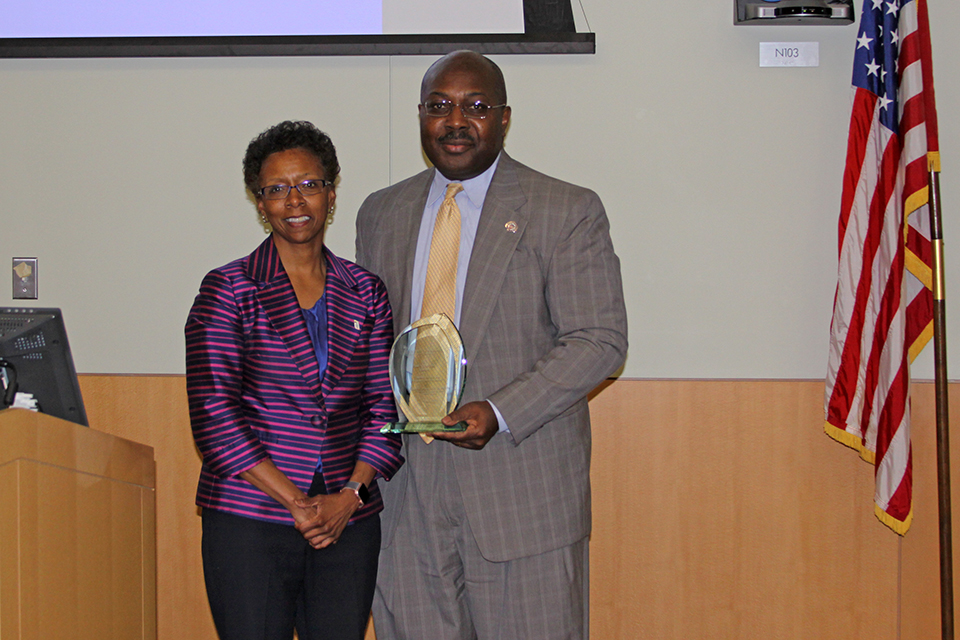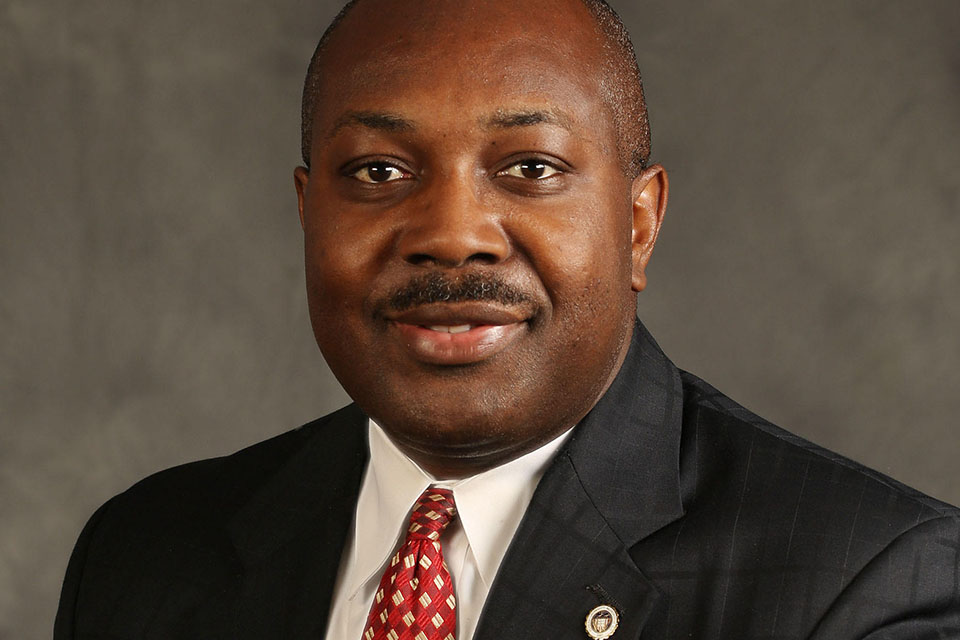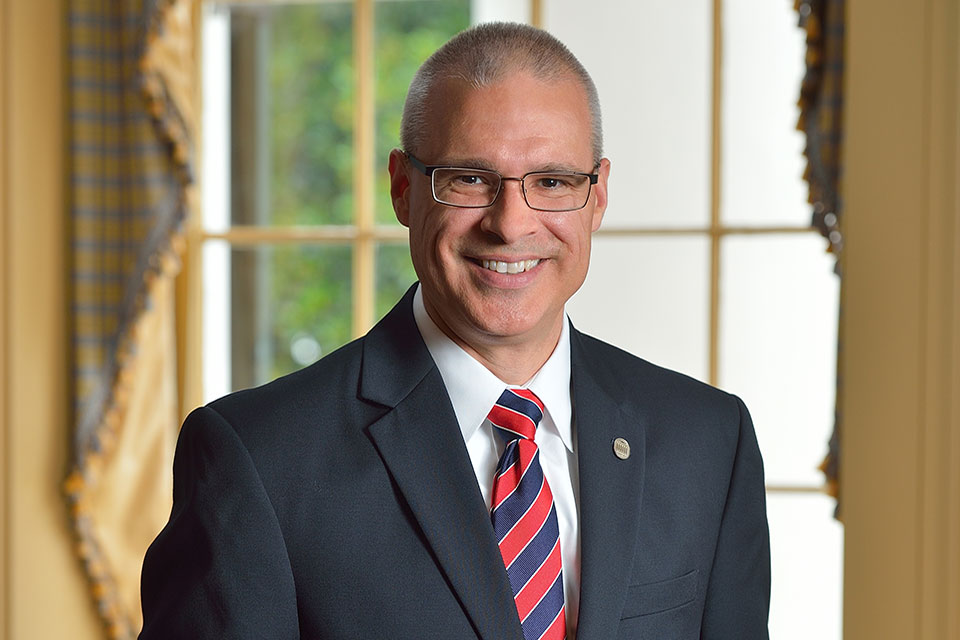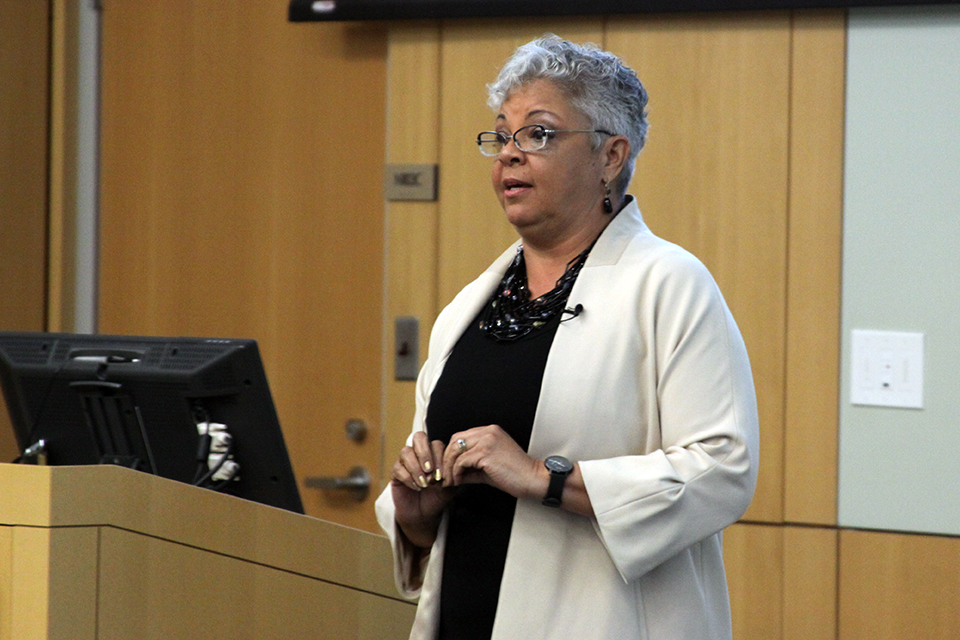SOP’s Annual Pumpian Lecture Offers Global Perspective on Pharmacy Education
Alumnus Dr. Anthony K. Wutoh discusses challenges facing pharmacy education around the world and offers insight on how universities can prepare students for today’s increasingly global environment.

By Malissa Carroll
April 20, 2017
Faculty, staff, and students gathered in Pharmacy Hall on April 11 as the University of Maryland School of Pharmacy presented its annual Paul A. Pumpian Memorial Lecture. Titled “Pharmacy Education in an Increasingly Global Environment,” the lecture delivered by Anthony K. Wutoh, BSP ’90, PhD ’96, provost and chief academic officer for Howard University, highlighted the increasing globalization of health professional education, with a special emphasis on pharmacy education, and described Howard University’s ongoing efforts to develop and facilitate international experiences for its students.
“The Paul A. Pumpian Memorial Lecture provides a wonderful opportunity for the School of Pharmacy to welcome experts on a wide range of topics relevant to the pharmacy profession and the field of pharmaceutical health services research,” said Natalie D. Eddington, PhD, FCP, FAAPS, dean and professor of the School, as she opened the lecture. “In addition to leading a remarkable career, which has spanned the fields of pharmacoepidemiology, international health, and health services and outcomes research, Dr. Wutoh is a respected alumnus of the School of Pharmacy, having earned both his Bachelor of Science in pharmacy and doctorate in pharmacy administration from our institution. His lecture today promises not to disappoint.”
A native of Ghana, Wutoh has led and participated in a number of international programs, including sponsored projects in Nigeria, South Africa, Zambia, Kenya, Tanzania, and Ethiopia. Speaking to his extensive experience in the field, he kicked off his lecture with a discussion of several important issues related to global pharmacy education and practice, including the emigration of trained health care professionals from developing countries to developed countries, the need to expand clinical training opportunities for pharmacists, and the need to improve health care standards and quality for patients around the world.
“The role of pharmacists around the world is evolving to meet public demand, particularly as it relates to the safe and effective use of medications,” said Wutoh. “This trend is driving governments and academic institutions to re-evaluate pharmacy education and consider whether pharmacists should be trained as more clinically-oriented health care professionals. We know that increasing pharmacists’ clinical responsibilities in a society that is not ready to absorb that additional capacity has consequences, yet we cannot always wait for society to catch up before we demand more from these medication experts.”
Wutoh also spoke about the Accreditation Council for Pharmacy Education’s (ACPE) efforts to help institutions and countries around the world improve the quality of their pharmacy education and services, as well as the way in which they deliver health care to patients. He noted that ACPE recently established an International Services Program and initiated a process to certify international pharmacy education programs that includes criteria comparable to the accreditation standards to which all pharmacy schools in the United States must adhere.
“Ultimately, the goal of these efforts is to provide an opportunity for patients around the world to receive better pharmaceutical care,” said Wutoh. “However, to reach this goal, we must be willing to meet institutions where they are at the present moment and help them improve the quality of their pharmacy education programs in a manner that makes sense for their unique circumstances.”
Reflecting on his experience at Howard University, Wutoh also offered his personal perspective on the importance of global collaborations for health professional schools, explaining that these collaborations not only provide support to international institutions that seek to develop health and educational opportunities for their faculty, staff, and students, but also help faculty and students at institutions in the United States gain a greater appreciation of the connectedness of the world. “It is a two-way relationship. We are not simply exporting education to other countries. There is a great deal that we can learn from the international institutions with which we partner to further advance and improve our programs here in the United States,” he emphasized.
To conclude his lecture, Wutoh provided examples of the different types of global collaborations in which Howard University is involved, including partnerships with educational institutions, collaborations with non-governmental organizations, signing of Memorandums of Understanding for faculty and student exchanges, and partnerships with foreign governments to address challenges facing pharmacy education nationwide. He spoke about a wide range of international projects in which students and faculty alike from Howard University College of Pharmacy have participated, such as establishing a pediatric HIV clinic in Zambia, managing an HIV public health project in South Africa, and establishing a pharmaceutical manufacturing facility at St. Luke’s Foundation School of Pharmacy in Tanzania in collaboration with Purdue University.
“The faculty and students at Howard University come from diverse populations, and many are immigrants themselves who seek to reconnect with their cultures,” said Wutoh. “To help foster faculty and students’ continued interest in international engagement, we have created an infrastructure to facilitate these experiences, many of which raise awareness – particularly among our students – of what it means to practice in a resource-challenged environment. Our students learn that many of the technologies available to us as pharmacists in the United States simply are not accessible to health care professionals in other parts of the world.”



